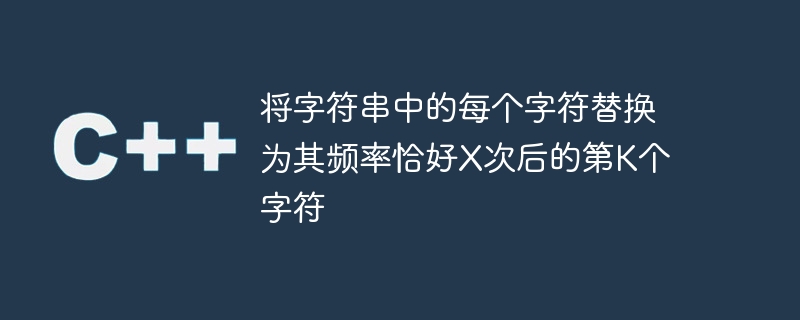将字符串中的每个字符替换为其频率恰好X次后的第K个字符

在这个问题中,我们给出了一个字符串“str”、整数 K 和整数 X。该字符串“str”仅包含 1 到 9 之间的整数。我们必须对该字符串执行 X 次操作。操作就是每次我们都要用字符串中的一个字符替换它出现的次数。这里的频率是指字符串中字符的个数或值。我们的任务是在执行给定操作 X 次后返回第 k 个字符。
示例
Input 1: str = “1231”, K = 5, X = 3
Output 1: 2
说明
我们已经执行了 3 次给定的操作。
1st time, str = 1223331 as
对于字符str[0],频率为1,值为1,因此1出现1次。
对于字符str[1],频率是2,值是2,所以2出现了2次。
其他角色也类似。
2nd time, str = 122223333333331 3rd time, str = 1222222223333333333333333333333333331
所以恰好 X 次之后字符串的第 K 个字符是 2。所以答案是 2。
Input 2: str = “1121”, K = 2, X = 5
Output 2: 2
我们已经看到了上面给定字符串的示例,让我们转向方法 -
天真的方法
在这种方法中,我们通过执行给定的操作来计算新字符串直到 X 次。在获得恰好 X 次的字符串后,我们返回该字符串的第 K 个字符。
示例
让我们看一下代码,以便更好地理解上述方法 -
#include <bits/stdc++.h>
using namespace std;
// Function to find the Kth character of the string after X times
char findKthChar(string str, long long K, int X){
string s = str; // create another string to store the give string as we need to update the string
for (int i = 0; i < X; i++) {
string temp = ""; // To store the temporary result of each time
for (int j = 0; j < s.size(); j++) {
int freq = s[j] - '0'; // getting freq of char s[j]
// adding char value its frequency times to 'temp' result.
while (freq--) {
temp += s[j];
}
}
s = temp; // update the string after.
}
return s[K - 1]; // return Kth character of X times string
}
int main(){
// Given Input
string str = "1231";
long long K = 5;
int X = 3;
// Function Call
char result = findKthChar(str, K, X);
cout << result << "\n";
return 0;
}
输出
2
时间和空间复杂度
时间复杂度取决于给定的字符串数字,并且等于数字的 x 次方以及每个数字的总和。
空间复杂度与时间复杂度完全相同。
高效的方法
它是上述方法的优化版本。其中我们计算 X 次每个包机的范围,而不是每次都创建一个字符串。
在这里我们观察到,每次角色相对于角色值都会增加时间的幂。
让我们在下面讨论上述方法的主要步骤 -
创建 kthChar 变量来存储 x 次字符串的 KthChar
创建变量tot来存储X次后每个字符出现的计数
使用for循环遍历字符串并执行以下步骤
返回第 kthChar
->获取当前字符的值
->使用该值和 X,我们可以得到 X 次后当前字符的范围。正如我们观察到的,每次角色的力量值都会增加 X
作为 pow(value, X)。
−> 将该范围存储在变量“tot”中,以维持 X 次后字符串的长度
−> 检查 X 次后第 K 个字符是否位于字符串的当前长度内
As (K <= tot) if yes 则中断 for 循环并将当前字符存储到变量“kthChar”<= tot) if yes 则中断 for 循环并将当前字符存储到变量“kthChar”
示例
#include <bits/stdc++.h>
using namespace std;
// Function to find the Kth character of the string after X times
char findKthChar(string str, long long K, int X){
char kthChar; // Variable to store the KthChar of x times string
int tot = 0; // to store the count of the each character occur after the X times
// Traverse the string 'str'
for (int i = 0; i < str.size(); i++) {
int value = str[i] - '0'; // Convert char into int to get the value
// Calculate each characters occuring range
int charRange = pow(value, X);
tot += charRange;
// If K is less than tot than kthChar is str[i]
if (K <= tot) {
kthChar = str[i];
break; // break the for loop
}
}
// Return answer, kthChar of the string after X times
return kthChar;
}
int main(){
string str = "1231"; // given string
long long K = 5; // given integer
int X = 3; // given integer
// Function Call to get the kth character after X times
char result = findKthChar(str, K, X);
// Print the result
cout << result << "\n";
return 0;
}
输出
2
时间和空间复杂度
上述代码的时间复杂度为O(N),其中N是给定长度的大小。
上述代码的空间复杂度为 O(1),因为我们没有使用任何额外的空间。
结论
在本教程中,我们实现了一个程序,用于在将 String 中的每个字符替换为其频率恰好 X 次后找到第 K 个字符。我们实现了两种方法,一种是朴素方法,另一种是有效方法。
以上是将字符串中的每个字符替换为其频率恰好X次后的第K个字符的详细内容。更多信息请关注PHP中文网其他相关文章!

热AI工具

Undresser.AI Undress
人工智能驱动的应用程序,用于创建逼真的裸体照片

AI Clothes Remover
用于从照片中去除衣服的在线人工智能工具。

Undress AI Tool
免费脱衣服图片

Clothoff.io
AI脱衣机

AI Hentai Generator
免费生成ai无尽的。

热门文章

热工具

记事本++7.3.1
好用且免费的代码编辑器

SublimeText3汉化版
中文版,非常好用

禅工作室 13.0.1
功能强大的PHP集成开发环境

Dreamweaver CS6
视觉化网页开发工具

SublimeText3 Mac版
神级代码编辑软件(SublimeText3)

热门话题
 PHP中int类型转字符串的方法详解
Mar 26, 2024 am 11:45 AM
PHP中int类型转字符串的方法详解
Mar 26, 2024 am 11:45 AM
PHP中int类型转字符串的方法详解在PHP开发中,经常会遇到将int类型转换为字符串类型的需求。这种转换可以通过多种方式实现,本文将详细介绍几种常用的方法,并附带具体的代码示例来帮助读者更好地理解。一、使用PHP内置函数strval()PHP提供了一个内置函数strval(),可以将不同类型的变量转换为字符串类型。当我们需要将int类型转换为字符串类型时,
 python怎么重复字符串_python重复字符串教程
Apr 02, 2024 pm 03:58 PM
python怎么重复字符串_python重复字符串教程
Apr 02, 2024 pm 03:58 PM
1、首先打开pycharm,进入到pycharm主页。2、然后新建python脚本,右键--点击new--点击pythonfile。3、输入一段字符串,代码:s="-"。4、接着需要把字符串里面的符号重复20次,代码:s1=s*20。5、输入打印输出代码,代码:print(s1)。6、最后运行脚本,在最底部会看到我们的返回值:-就重复了20次。
 Golang中如何检查字符串是否以特定字符开头?
Mar 12, 2024 pm 09:42 PM
Golang中如何检查字符串是否以特定字符开头?
Mar 12, 2024 pm 09:42 PM
Golang中如何检查字符串是否以特定字符开头?在使用Golang编程时,经常会遇到需要检查一个字符串是否以特定字符开头的情况。针对这一需求,我们可以使用Golang中的strings包提供的函数来实现。接下来将详细介绍如何使用Golang检查字符串是否以特定字符开头,并附上具体的代码示例。在Golang中,我们可以使用strings包中的HasPrefix
 Golang字符串是否以指定字符结尾的判断方法
Mar 12, 2024 pm 04:48 PM
Golang字符串是否以指定字符结尾的判断方法
Mar 12, 2024 pm 04:48 PM
标题:Golang中判断字符串是否以指定字符结尾的方法在Go语言中,有时候我们需要判断一个字符串是否以特定的字符结尾,这在处理字符串时十分常见。本文将介绍如何使用Go语言来实现这一功能,同时提供代码示例供大家参考。首先,让我们来看一下Golang中如何判断一个字符串是否以指定字符结尾的方法。Golang中的字符串可以通过索引来获取其中的字符,而字符串的长度可
 解决PHP中16进制转字符串出现中文乱码的方法
Mar 04, 2024 am 09:36 AM
解决PHP中16进制转字符串出现中文乱码的方法
Mar 04, 2024 am 09:36 AM
解决PHP中16进制转字符串出现中文乱码的方法在PHP编程中,有时候我们会遇到需要将16进制表示的字符串转换为正常的中文字符的情况。然而,在进行这个转换的过程中,有时会遇到中文乱码的问题。这篇文章将为您提供解决PHP中16进制转字符串出现中文乱码的方法,并给出具体的代码示例。使用hex2bin()函数进行16进制转换PHP内置的hex2bin()函数可以将1
 如何在Go语言中截取字符串
Mar 13, 2024 am 08:33 AM
如何在Go语言中截取字符串
Mar 13, 2024 am 08:33 AM
Go语言是一种强大且灵活的编程语言,它提供了丰富的字符串处理功能,包括字符串截取。在Go语言中,我们可以使用切片(slice)来截取字符串。接下来,将详细介绍如何在Go语言中截取字符串,并附上具体的代码示例。一、使用切片截取字符串在Go语言中,可以使用切片表达式来截取字符串的一部分。切片表达式的语法如下:slice:=str[start:end]其中,s
 PHP字符串操作:有效去除空格的实用方法
Mar 24, 2024 am 11:45 AM
PHP字符串操作:有效去除空格的实用方法
Mar 24, 2024 am 11:45 AM
PHP字符串操作:有效去除空格的实用方法在PHP开发中,经常会遇到需要对字符串进行去除空格操作的情况。去除空格可以使得字符串更加整洁,方便后续的数据处理和显示。本文将介绍几种有效的去除空格的实用方法,并附上具体的代码示例。方法一:使用PHP内置函数trim()PHP内置函数trim()可以去除字符串两端的空格(包括空格、制表符、换行符等),非常方便且简单易用
 PHP字符串操作:去除多余逗号,保留唯一逗号实现技巧
Mar 28, 2024 pm 03:02 PM
PHP字符串操作:去除多余逗号,保留唯一逗号实现技巧
Mar 28, 2024 pm 03:02 PM
PHP字符串操作:去除多余逗号,保留唯一逗号实现技巧在PHP开发中,字符串处理是一个非常常见的需求。有时候我们需要对字符串进行处理,去除多余的逗号,保留唯一的逗号。在这篇文章中,我将介绍一种实现技巧,并提供具体的代码示例。首先,我们来看一个常见的需求:假设我们有一个包含多个逗号的字符串,我们需要去除多余的逗号,只保留唯一的逗号。例如,将"apple,ba






